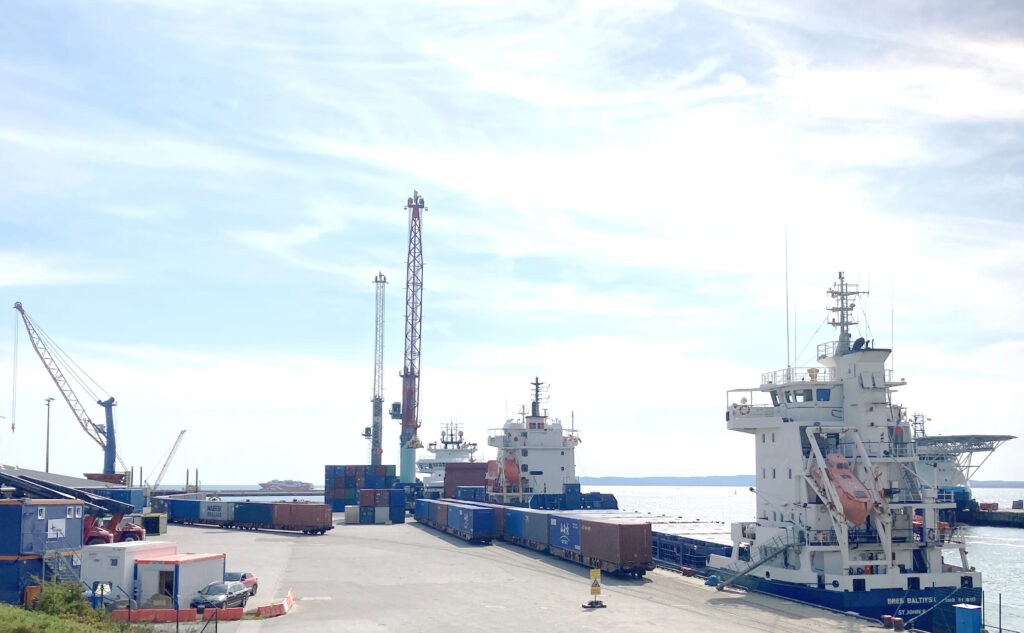The EU-co-funded project creates new connections for freight and passenger transport and optimises hinterland connections in the southern Baltic Sea region
Hamburg, 2 November 2021 – The transnational project “South Baltic Transport Loops” (SBTL), supported by the European Union and initially developed by Hamburg Port Consulting (HPC) recently held its closing conference in Copenhagen. Aimed at assisting in the development of smaller and medium-sized ports in the region, a number of significant new sea connections have resulted.
The main focus of the partners in the project, the ports of Elblag, Karlshamn, Mukran and Roenne, and the Klaipeda Shipping Research Centre is developing and implementing new regular services and ship connections for container, bulk and general cargo transport, and ferry services. Attention is also being placed on improving the intermodal hinterland connections of the ports. Representatives of the project partners presented their results at the closing conference in Copenhagen on 28 September.
HPC developed the project in 2016, applied for funding and has been coordinating it since 2018. Dr Olaf Zeike, Senior Consultant at HPC and the project manager in charge, takes positive stock: “With the activities promoted by the SBTL project, the course has been set for sustainable development of the partner ports in the southern Baltic Sea region. Despite Corona-related delays, we can be proud of the team effort that has been achieved across the countries involved in the project.” The list of innovations and improvements is impressive.

A total of three new connections in cargo transport have been established so far: to build the “Baltic Sea Bridge” for container transport between Europe and China, a regular connection was set up to run several times a week between the port of Mukran (Saßnitz) on the island of Rügen and Baltysk. The latter belongs to the Russian Kaliningrad region and allows for a connection to the New Silk Road by rail from and to Xi’an, China.
The creation of a new connection between Mukran and Karlshamn in February 2021 also provided the southern Swedish port with access to the New Silk Road. “Large investments are being made to strengthen and expand the transport corridor between Sweden and Eastern Europe/CIS/China via Karlshamn,” says Ulf Sandevärn, Marketing Manager, Port of Karlshamn.
New ferry connections have been established between the southern Swedish ports of Ystad and Mukran, which will serve in responding to an expected increase in tourism with up to two departures daily in the summer, bearing particular relevance for passenger traffic and tourism.
Between Roenne on the island of Bornholm and Mukran, it was possible to switch to a year-round ferry service and increase the number of weekly departures. “The connection to Mukran has strengthened the central importance of the Port of Roenne as Bornholm’s supply port,” says Maja Felicia Bendtsen, Chief Business Officer – Bulk, Port of Roenne.
As regards the ferry service between Karlshamn and Klaipeda, Lithuania, in addition to an increase in frequency, port capacity has also been extended and prepared for the use of larger ferries.
“At the Port of Elblag, extensive preparatory work was carried out for the future development of the port upon completion of the new canal between the Baltic Sea and the Vistula Lagoon,” explains Arkadiusz Zglinski, Director of the Port of Elblag.
“The southern Baltic Sea region is developing very quickly, and it is important that the forecast of passenger and cargo flows is as accurate as possible,” says Prof. Vytautas Paulauskas of the Klaipeda Shipping Research Centre, who has been analysing traffic flows in the region.
In terms of improving hinterland connections, bus lines to the ports of Karlshamn and Mukran have been optimised. The railway hinterland connection for container transport to and from the ports of Karlshamn and Mukran has also been improved.
“Mukran is the closest German port to Sweden, Bornholm, Finland, Russia and the Baltic States and serves as a gateway to Western Europe,” says Helmut Seilert, Senior Manager Business Development & Logistics, Fährhafen Sassnitz GmbH. “Thanks to the project, the improved hinterland connection for freight transport enables green transport by rail from the Baltic Sea to numerous destinations in Germany and to Rotterdam.”
The South Baltic Transport Loops project has been funded by the Interreg South Baltic programme, which utilises funds from the European Regional Development Fund (ERDF). Interreg is one of the European Union’s (EU) main instruments for promoting cross-border cooperation through project funding. The programme aims to find common solutions in the areas of transport and sustainability, among others. For example, projects funded under the heading “Blue Growth” address the economic potential of the Baltic Sea for economic growth and employment along the coasts of the Baltic Sea.
“The SBTL project has vividly filled the Interreg programme priorities with life,” Olaf Zeike concludes. “Together, the project partners have worked towards sustainable, innovative solutions that are attractive for business and tourism in the region and promote cooperation.”
For more information, visit www.southbaltictransportloops.EU
About HPC
Hamburg Port Consulting (HPC) operates as a logistics consulting company, specialising in strategy and transformation services for the ports, terminals, and rail sectors. Since its establishment in 1976, the Hamburg-based consulting company has delivered approximately 1,700 projects across 130 countries spanning six continents, along the entire port project development cycle. HPC employs about 100 domain experts with a background as terminal operators, software engineers, logistics managers, transport economists and mathematicians. As a subsidiary of the Hamburg Port and Logistics Corporation (HHLA), HPC has its roots in port handling of container, break bulk and multipurpose, as well as hinterland operations. www.hamburgportconsulting.com






